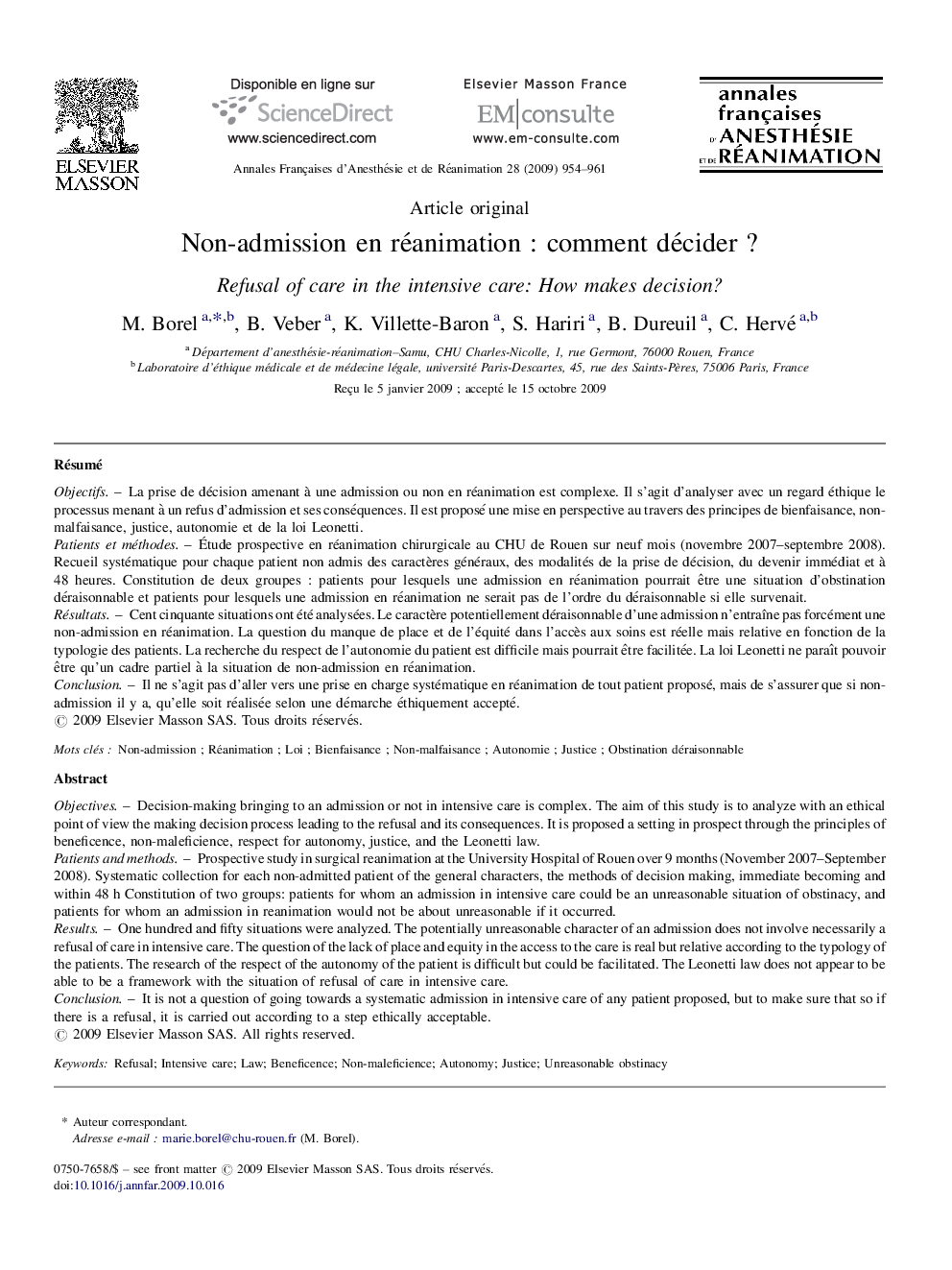| Article ID | Journal | Published Year | Pages | File Type |
|---|---|---|---|---|
| 2747382 | Annales Françaises d'Anesthésie et de Réanimation | 2009 | 8 Pages |
RésuméObjectifsLa prise de décision amenant à une admission ou non en réanimation est complexe. Il s’agit d’analyser avec un regard éthique le processus menant à un refus d’admission et ses conséquences. Il est proposé une mise en perspective au travers des principes de bienfaisance, non-malfaisance, justice, autonomie et de la loi Leonetti.Patients et méthodesÉtude prospective en réanimation chirurgicale au CHU de Rouen sur neuf mois (novembre 2007–septembre 2008). Recueil systématique pour chaque patient non admis des caractères généraux, des modalités de la prise de décision, du devenir immédiat et à 48 heures. Constitution de deux groupes : patients pour lesquels une admission en réanimation pourrait être une situation d’obstination déraisonnable et patients pour lesquels une admission en réanimation ne serait pas de l’ordre du déraisonnable si elle survenait.RésultatsCent cinquante situations ont été analysées. Le caractère potentiellement déraisonnable d’une admission n’entraîne pas forcément une non-admission en réanimation. La question du manque de place et de l’équité dans l’accès aux soins est réelle mais relative en fonction de la typologie des patients. La recherche du respect de l’autonomie du patient est difficile mais pourrait être facilitée. La loi Leonetti ne paraît pouvoir être qu’un cadre partiel à la situation de non-admission en réanimation.ConclusionIl ne s’agit pas d’aller vers une prise en charge systématique en réanimation de tout patient proposé, mais de s’assurer que si non-admission il y a, qu’elle soit réalisée selon une démarche éthiquement accepté.
ObjectivesDecision-making bringing to an admission or not in intensive care is complex. The aim of this study is to analyze with an ethical point of view the making decision process leading to the refusal and its consequences. It is proposed a setting in prospect through the principles of beneficence, non-maleficience, respect for autonomy, justice, and the Leonetti law.Patients and methodsProspective study in surgical reanimation at the University Hospital of Rouen over 9 months (November 2007–September 2008). Systematic collection for each non-admitted patient of the general characters, the methods of decision making, immediate becoming and within 48 h Constitution of two groups: patients for whom an admission in intensive care could be an unreasonable situation of obstinacy, and patients for whom an admission in reanimation would not be about unreasonable if it occurred.ResultsOne hundred and fifty situations were analyzed. The potentially unreasonable character of an admission does not involve necessarily a refusal of care in intensive care. The question of the lack of place and equity in the access to the care is real but relative according to the typology of the patients. The research of the respect of the autonomy of the patient is difficult but could be facilitated. The Leonetti law does not appear to be able to be a framework with the situation of refusal of care in intensive care.ConclusionIt is not a question of going towards a systematic admission in intensive care of any patient proposed, but to make sure that so if there is a refusal, it is carried out according to a step ethically acceptable.
